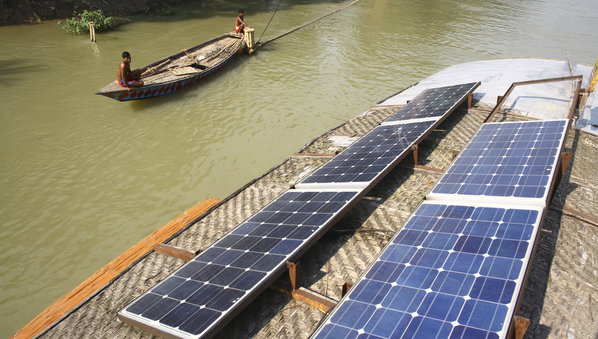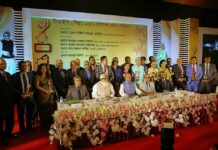by G.M.B. Akash / Panos
More than the technology it is the advocacy that allowed the Bright Green Energy Foundation (BGEF) to install more than 145,000 solar home systems (SHS) that benefit eight million rural people in Bangladesh.
SHS units including solar panels, battery and regulator are not displayed in showrooms. Instead BGEF has been directly promoting the benefits of its environment-friendly technology in the field since 2010, when it was registered.
Dipal Chandra Barua, the founder of BGEF, puts his faith in rural-based Green Technology Centres (GTC) managed by women trained as technicians to handle free after sales service that keep the units running for the first five years after installation.
Barua says the programme provides job opportunities for women, besides ensuring affordable off-grid power in rural Bangladesh. “Only if it is cheap and efficient will it work for the poor who need it most. The strategy is responsible for the popularity of the SHS in Bangladesh,” Barua tells SciDev.Net.
“In a country where half the population still does not have access to power supply (58 per cent get power from national grid), I believe solar can be a powerful tool to help grow the economy faster,” adds Barua. Bangladesh’s current population is estimated at 160 million people.
A basic 100 watt panel installed on the roof costs about 50,000 Taka (US$ 640) and, depending on need, can be scaled up. A 250 watt panel can generate up to 1 kilowatt of power per day and BGEF offers easy repayment plans to clients.
BGEF was shortlisted for the ‘Ashden International Awards 2015’ mainly for empowering rural women to become technicians and entrepreneurs in renewable energy. When the awards were announced on 11 June BGEF did not get a prize.
The women are not complaining. Shapla Aktar, 27, who has been with BGEF for about three years and is now branch manager at Madhukali village in Faridpur district is happy that BGEF was among the 10 shortlisted. “I am also proud to be a female manager. I am well respected in the community and I take major decisions in my family,” Shapla, who sells an average of 15 SHS sets a month, tells SciDev.Net.
The reliability and affordability of the SHS sets are such that they now also power small businesses. Alam Abdul Aleema has been running his mobile phone repair service in the Balagonj village of Sylhet district on a 20 watt SHS unit for more than a year. “I now have the uninterrupted power on instalments of just Taka 450 (US$ 5) per month that I pay BGEF.”
With such successes BGEF is increasingly moving to its services from the rural areas to the urban centres of the country, where grid power is unreliable and subject to frequent blackouts.
Bangladesh plans to generate 220 megawatts of solar power by 2017 when the SHS scheme would be covering six million homes across the country, says Barua.
Source: Scidev










